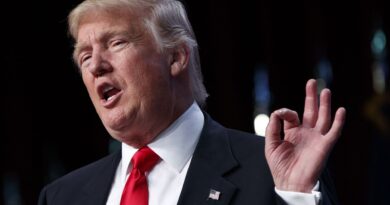How rural Nevada became the next battleground for the ‘Big Lie’
Just six weeks after the 2020 election, a group of Nevada Republicans gathered outside the Legislative Building in Carson City to pledge the state’s six electoral votes to Donald Trump.
Unlike other swing states, there was never much worry that Nevada — with a Democratic governor and Democratic majorities in the Legislature — would have its normal electoral count process hijacked by Republicans attempting to overturn the election. The state’s six electoral votes were cast for Joe Biden, who won the state by more than 33,000 votes.
Since the conclusion of the 2020 election, though, a stream of Trump’s most fervent supporters and allies in Nevada have led calls to overturn the results of the election and spread unproven claims of widespread election fraud while casting doubt on the state’s election system.
But with Democrats in control of the levers of power, Republican election activists, including secretary of state candidate Jim Marchant and unsuccessful gubernatorial candidate Joey Gilbert, turned to another path — rural county commissioners.
In the wake of Trump’s loss, a handful of rural county commissioners, who wield power as policy-setters and executive officers in some of Nevada’s least-populated corners, brought forward “election integrity” measures and promulgated false claims about the 2020 election.
Hundreds of emails obtained via records requests, reviews of county commission meetings across the state and interviews with county officials show how their pursuits melded with ideas from the likes of Marchant and Gilbert, who worked through county commissioners to bring fringe conspiracy theories about voting machines to the center of county politics and state election administration.
Their efforts to make election-related changes targeted the state’s rural and right-leaning areas, building momentum for what they hoped would become a statewide trend.
“I am convinced the last election was stolen and have been involved in every way I can think of to reveal the steal and fix the system,” Elko County Commissioner Rex Steninger wrote in an October 2021 email obtained through a public records request.
On this new path, Marchant, Gilbert and other election deniers have been much more successful.
Last year, their crusade to eliminate electronic voting machines spread like a late summer wildfire through deep red, rural Nevada. By spring, Marchant, who defeated a well-funded moderate challenger in the Republican primary for secretary of state, became one of the more visible leaders in the renewed efforts to push the Silver State’s election system decades backward.
“We’re trying to get as many of the rural counties as we can to get on this, and then force Clark and Washoe to do the same thing at some point,” he said during an Esmeralda County meeting in April.
In a typical election year, election officials would spend April preparing primary ballots and gearing up their staff.
Instead, this year, four county clerks faced possible monumental changes. In the span of a week, commissioners in Lyon, Elko, Esmeralda and Lincoln counties, where Trump won overwhelmingly in 2020, put forward proposals to reconsider the use of Dominion electronic voting machines or ditch them entirely. The requests echoed unfounded conspiracy theories that the machines had somehow switched vote totals in the 2020 election.
Only a month earlier, an internecine strife had ripped open in Nye County, pitting the all-Republican Board of County Commissioners against the longtime Republican clerk, who pushed back on efforts to make the county drop electronic voting machines and implement a system of hand-counting ballots.
By the end of summer, the clerk had resigned from the role she served in for the past 22 years. The commissioners installed in her place an interim clerk, who believed Trump won the 2020 election and had expressed a desire to hand count ballots.
“We’re trying to get as many of the rural counties as we can to get on this, and then force Clark and Washoe to do the same thing at some point.”
— Republican secretary of state candidate Jim Marchant, during an April meeting of the Esmeralda County commissioners
Despite their reliance on a collection of faulty, misguided and disproven evidence and a high-profile failure in Washoe County, election deniers leading the charge have already made their mark.
In Nye County, home to more than 32,000 registered voters, the new clerk plans to largely eliminate electronic voting machines and count votes both by hand and using mechanical tabulators — a move that has prompted lawsuits and forced state officials to adopt last-minute regulations for the antiquated practice of hand counting ballots.
Lander County discarded its Dominion machines, opting instead to use machines from another major manufacturer of electronic voting equipment. And, earlier this year, in tiny Esmeralda County, commissioners and election staff hand counted 317 paper ballots over the course of more than seven hours, finishing just before the deadline to certify the results of the primary election.
Gowri Ramachandran, an elections expert and senior counsel for the Brennan Center of Justice’s Democracy program, took issue with those changes, pointing to logistical issues and higher error rates associated with hand counting ballots. She said conspiracies about the 2020 election have caused an “unwarranted, extreme level of suspicion about election equipment.”
“Unless you’re in a very small jurisdiction, hand counting, it’s prone to a lot more error, actually, than machine counting,” she said. “People make mistakes when they get tired … It’s way more time consuming and way more room for error when you’re doing a hand count of everything on the ballot.”
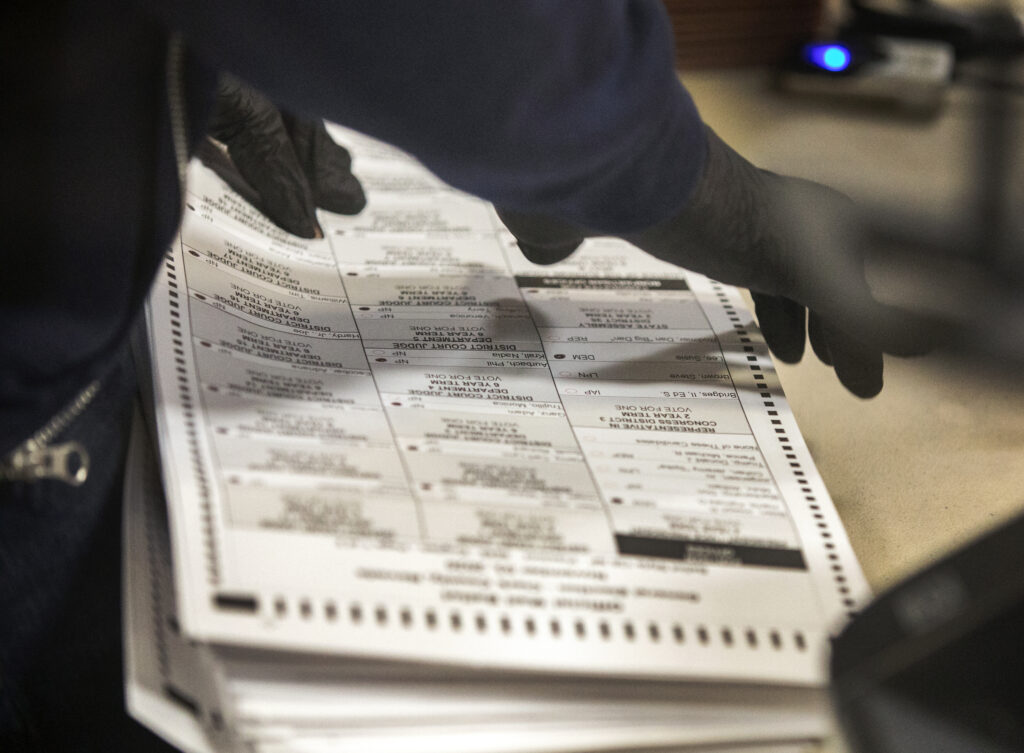
The 2020 election and a denial of reality
When Trump lost the 2020 election, it triggered an outpouring of unproven and debunked claims about widespread voting fraud and irregularities — often boosted by the president himself.
In Nevada, Trump’s lawyers, his supporters and several Republican candidates filed lawsuits alleging issues with the state’s newly implemented vote-by-mail system and with signature verification in populous Clark County, with one even seeking to declare Trump the winner of Nevada’s six electoral votes. All of these lawsuits were dismissed, either voluntarily or by the courts, as judges throughout the state found no concrete evidence of machine malfunctions or improper votes.
Republican Secretary of State Barbara Cegavske, the state’s top election official, led reviews of the 2020 election, finding no evidence of widespread fraud to overturn President Joe Biden’s 33,596-vote margin of victory over Trump. Her office also debunked the state Republican Party’s allegations of massive voter fraud in the election, finding the evidence was without merit.
Instead, fewer than a dozen cases involving potential deceased voters were referred to law enforcement for further investigation. So far, the attorney general’s office has prosecuted only a single case of voter fraud stemming from the 2020 election, in which a Republican Clark County man (who had claimed someone had fraudulently voted in his wife’s name) voted twice using both his own ballot and a ballot sent to his deceased wife.
The inaccurate belief that Trump won the 2020 election survives in Nevada, affecting voters’ trust in the election system. An April Nevada Independent/OH Predictive Insights poll found that more than half of registered Republican voters were not confident or only somewhat confident that the 2022 election results in Nevada will be accurate.
Since the 2020 election, the “big lie” has morphed into a new focus in Nevada — targeting the state’s electronic voting systems.
“It is imperative that you secure the trust of your constituents in Nye County by ensuring that you have a fair and transparent election, and the only way to do that is to not use electronic voting or tabulation machines,” Marchant told the Nye County commissioners in March. “Instead, use a paper ballot with anti-counterfeitable measures built in, precinct-level voting and hand-tabulation voting system.”
Many of these ideas are rooted in Trump’s claims about the 2020 election. He railed against Dominion Voting Systems, whose voting equipment was used in 16 of 17 Nevada counties during the last general election. Trump’s lawyers made baseless claims tying the company to Venezuela and blaming Dominion machines for the election being stolen.
Since then, election-denying Republican activists have advanced the assault on Dominion machines, from framing them as hackable and not secure to claiming that they are rigged with software designed to switch votes.
But following their failures in court, they turned to a new venue for pursuing their goals — county boards of commissioners.
‘The ultimate goal is to prove fraud’
Across Nevada, a vast majority of county commissioners are Republican. Only in urban Clark County, where nearly three-quarters of the state’s population lives, are a majority of sitting commissioners Democrats.
And in rural, deep red communities, these election-denier activists found sympathetic ears for their 2020 election fraud claims and calls for drastic change.
During the summer of 2021, Steninger, a Republican commissioner in northeastern Elko County, where Trump defeated Biden by 55 points in 2020, attended what he described as a meeting of “lawyers and rabble-rousers” in Reno, where the group discussed methods and strategies on how to eliminate electronic voting in Nevada.
In an August 2021 email to an Elko County deputy district attorney, Steninger laid out the group’s interest in having “the rural counties … announce plans to shift to paper ballots,” which they believed would make the rest of the state “obliged to follow suit.”
“The ultimate goal is to prove fraud, reverse the recent election laws and have an honest election in 2022,” he wrote.
Of the state’s 3.1 million people, nearly 89 percent live in the two counties that include urban Reno and Las Vegas. The remaining 11 percent are spread out across Nevada’s vast desert landscape in 15 other counties, with county governments typically composed entirely of Republican elected officials.
This configuration of the state — plus general requirements that election rules and processes be the same county by county — gave the group a way to approach its goal by snowballing changes in rural counties and pressuring the more-populated Washoe and Clark counties, now in the minority, to follow suit.
Steninger outlined plans to use a recent amendment to the state Constitution — a portion of the voters’ bill of rights approved in 2020 that provides voters with the right to a “uniform, statewide standard for counting and recounting all votes accurately” — to force Clark County to follow the direction of rural counties switching to all paper ballots.
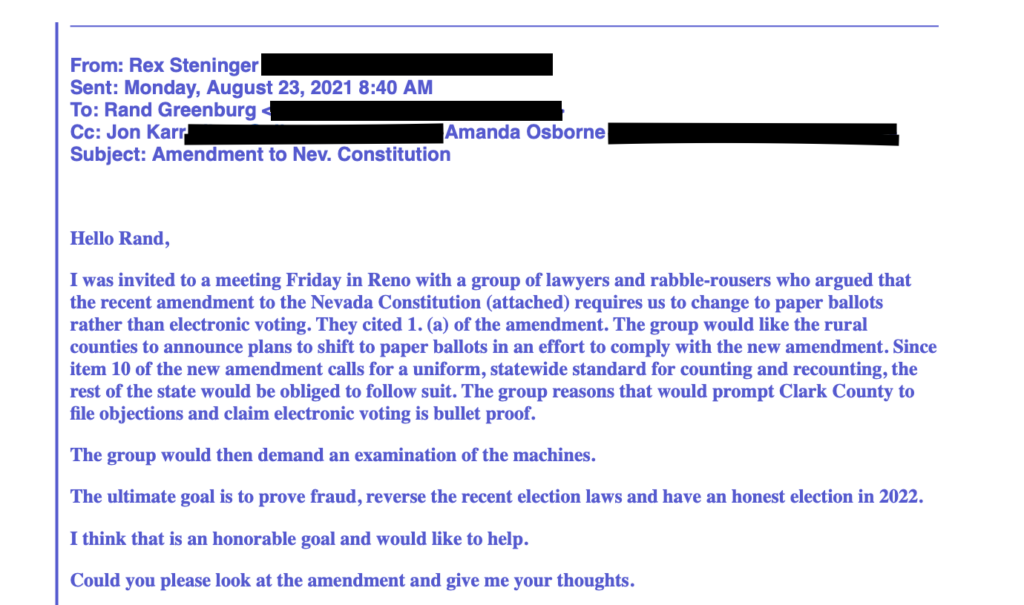
No litigation has arisen from such a plan, and at the time, Elko County Deputy District Attorney Rand Greenburg pushed back on the idea. He told Steninger in an email that he believes the section of the Constitution requires “the standard for counting and recounting votes be uniform,” and not “that all counties utilize the same methods for ballots.”
Still, with those plans in the works, by late summer of last year, multiple loosely organized groups had emerged as leaders in the charge to overhaul Nevada elections.
At the time, Steninger discussed the paper ballot plans in emails with a group of attorneys, including Joey Gilbert, a man who was outside the Capitol when it was violently stormed on Jan. 6, 2021, and who this year finished second in the Republican primary for governor. Another email recipient was Craig Mueller, a Las Vegas-based lawyer who represented many of the 2020 failed candidates challenging election results as well as Gilbert in his legal challenge to overturn the result of the 2022 primary election.
In an August email to The Nevada Independent, Gilbert emphasized his support for the changes, though he did not address any specific county-level efforts or his involvement in Elko and Lander counties.
“The machines must go,” Gilbert wrote. “I am 100 [percent] behind this movement and have been working alongside many county residents, —statewide to remove any/all machines, from all Nevada counties and move to hand counted, paper ballots.”
Though Elko County never made the switch to using strictly paper ballots, Steninger also mentioned in an email that “Lander County plans to discuss the plan” at one of its meetings in August.
That month, Lander County commissioners approved a retainer agreement with Gilbert as outside counsel to represent the county “in relation to voter integrity and election fraud in the State of Nevada, as it affects Lander County and the residents of Lander County.” The contract was canceled in October 2021 after Gilbert stepped down, and no lawsuits arose from the brief partnership.
Commissioners in Lander County, where fewer than 6,000 people live, also considered a proposal last fall to shift entirely away from electronic voting machines and instead to use paper ballots for voting in person.
But facing pushback from the county’s top election official, Lander County ultimately switched from Dominion Voting Systems to Election Systems & Software (ES&S), another major voting equipment company that uses slightly different technology than Dominion. The ES&S machines, also used in Carson City, are ballot-marking devices, meaning a voter’s choices are printed on a physical ballot that can be counted by hand.
Persisting election concerns drive pushes for Arizona-style 2020 audits
In the summer of 2021, months after Biden was inaugurated, Republican officials and voters in multiple Nevada counties remained hyper-focused on the outcome of the 2020 election.
Following in the footsteps of neighboring Arizona, where state lawmakers pushed for an independent audit of populous Maricopa County’s election results, commissioners in Lander County — where Trump won by a margin of more than 60 points in 2020 — pursued a “forensic audit” of their county’s Dominion voting machines.
During a September county commission meeting, Lander County Manager Bert Ramos said the purpose of the pursued audit was not about overturning a past election, but about preserving integrity in future county elections. He added that the commissioners believed Lander County’s election was secure, but they had concerns about how other Nevada counties conducted their elections and whether that may have diluted the votes of Lander County residents.
That messaging was repeated by prominent Republicans in the following months. Adam Laxalt, a U.S. Senate candidate, told voters in rural counties during campaign events last fall that their votes would count, while election issues actually stemmed from urban Clark County, the only Nevada county with more registered Democrats than Republicans, according to reporting from NBC News.
Unlike in Arizona, where a judge ruled that the ballots could be turned over for inspection, Lander County’s attempt at an audit was halted almost immediately. The Nevada secretary of state and the Department of Justice told county officials that it would violate state and federal laws, including the Civil Rights Act of 1960, which requires state and local election officials to retain and preserve voting records for 22 months after an election.
“As the voting records currently reside in the voting machines, and the election was not contested, those voting machines are not to be transferred to any other organization or entity in any situation, except as provided by law,” Secretary of State Barbara Cegavske wrote to the county clerk.
Lander County was not alone. Steninger, the commissioner in Elko County, also expressed interest in an audit. Elko County commissioners never pursued an audit, however.
“Let me know if you would like to examine our Dominion voting machines,” he wrote in an August 2021 email to the attorneys from the Reno meeting. “We can order an examination.”
Meanwhile, in Douglas County, where Trump defeated Biden by 29 points, the county’s top election official reportedly faced pressure from Laxalt, who served as Trump campaign co-chair in Nevada in 2020, to conduct an audit of ballot signatures from the 2020 election, according to records obtained by the left-leaning watchdog group American Oversight.
“I advised him that the law states that these signatures from the mail ballots are part of the official ballot and that under the law I am not allowed to release them. He argued with me stating he had never heard such a thing. I asked him if he would like me to email him the laws that I was referring to and he declined,” Douglas County Clerk Amy Burgans wrote in an email to the Deputy Secretary of State for Elections Mark Wlaschin.
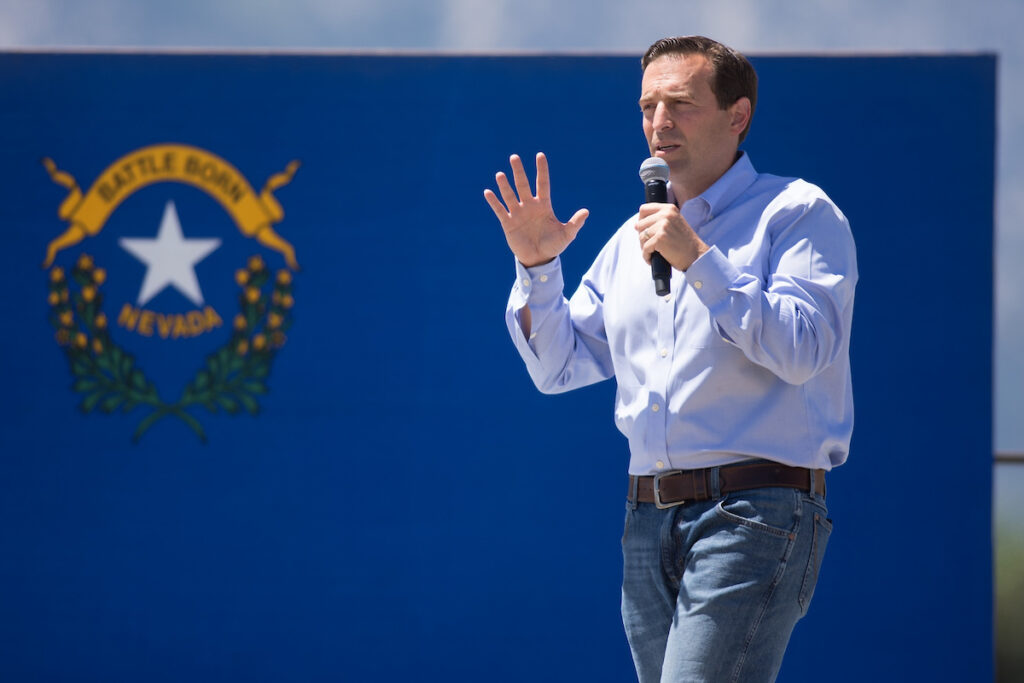
Laxalt’s request came around the same time as the release of the Arizona-based audit of Maricopa County election results on Sept. 24, 2021.
But it only marked the continuation of persistent efforts to audit election results across Nevada.
Earlier in the year, in June 2021, Burgans received an email from a group of Nevadans seeking “a full forensic audit of Clark County, Lyon County, Nye County, Washoe County and Pershing County.” One organizer from the group mentioned in an email that he met with attorneys working on the Arizona election audit to help guide their efforts to initiate an audit in Nevada. Their efforts failed to result in post-election audits in any county.
Such audits likely would have changed little in those counties. Both Lander and Douglas overwhelmingly voted for Trump, and their votes collectively accounted for 2.6 percent of all ballots cast in Nevada that year.
In rebutting claims that the machines had been hacked, county election officials often reminded county commissioners and concerned voters that each county’s voting machines were never connected to the internet. In some cases, election officials may use electronic poll books that connect to the intranet, which functions like an internal internet, though such devices are used for checking in voters and verifying signatures, not casting or recording votes.
‘It brought more tears than it was worth’
The latter months of 2021 saw few changes to election administration — only in Lander County did commissioners successfully get rid of Dominion machines.
But as county commissioners raised questions about the security of their local elections and angry voters buffeted county clerks with attacks on their integrity and time-consuming records requests, several top county election officials questioned their futures running elections.
Lander County Clerk Sadie Sullivan said in an interview that she was caught off guard by the commissioners’ request to take control of the county’s voting machines for an audit in August 2021, and she expressed concerns about similar efforts in other counties.
“That’s kind of where all the clerks are holding their breath and hoping that they don’t have to go through what we’ve been going through,” she said. “We’ve all just wanted it to be done, you know, legally.”
By the end of the year, Sullivan resigned as clerk, citing family medical issues. But her departure marked only a midpoint in a widespread churn of election officials across the state.
A year earlier, Douglas County Clerk-Treasurer Kathy Lewis resigned weeks after overseeing the 2020 election. In Mineral County, Clerk-Treasurer Chris Nepper had his last day in January of this year. In Storey County, Clerk-Treasurer Vanessa Stephens resigned in February. Her replacement, the previous chief-deputy clerk, resigned in September. Two more clerks, Nikki Bryan in Lyon County and Aubrey Rowlatt in Carson City, are not running for re-election.
County clerks typically have a vast set of responsibilities, which have grown with recent election laws expanding access for voters. Clerks oversee multiple weeks of early voting, send mail ballots to every registered voter who does not specifically request not to receive one, conduct same-day voter registration, all while continuing to maintain voter registration lists and carry out safe and secure elections.
Though some cited family issues or new jobs behind their resignations, other election officials were all but forced out of their jobs.
In Washoe County, Registrar of Voters Deanna Spikula faced death threats and months of harassment following the 2020 election, culminating in a leave of absence earlier this year and eventually her resignation. The pressure on election workers even resulted in staffing issues at the lower levels of election administration.
“My number one concern for next year is not being able to hire and retain temporary staff or poll workers. Without people, we can’t run an election. It is going to be scary next year as I am trying to bring on three temporary employees right now, and I only have one so far,” Spikula wrote in an email on Nov. 8, 2021, obtained by The Nevada Independent.
Like Spikula, Nye County Clerk Sandra Merlino, who served for more than 20 years in her position, faced backlash from incensed voters who believed the 2020 election was stolen.
Merlino, who described the 2020 election as the worst in her years as clerk, originally planned to retire from the position at the end of the year after declining to run for re-election. But as her county’s commissioners pursued a dramatic shift away from using machines in elections, she decided to retire early, after the primary election in June.
The commissioners even denied Merlino’s request to purchase an electronic ballot sorter — paid for through state funds — that would have helped scan envelopes as they came in, but not actually recorded or counted votes.
“That’s when I determined this isn’t going to work, because they’re not going to approve anything to make the job easier, as long as I’m still using these machines,” she said in an interview.
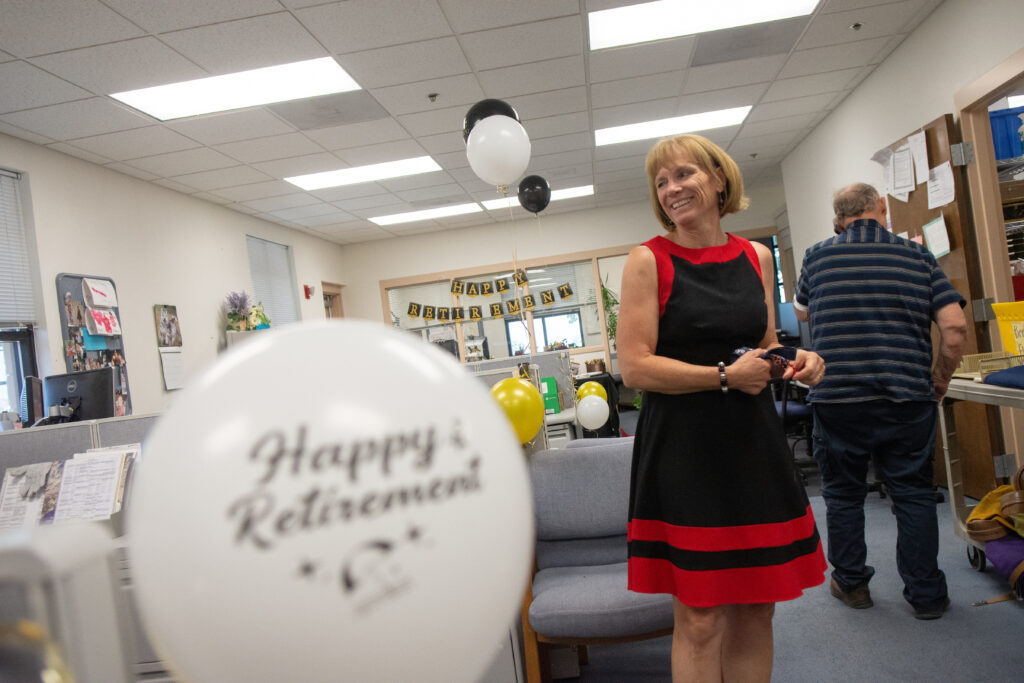
The turnover among clerks so far has amounted to roughly 60 years lost in collective experience overseeing elections. On Nov. 8, more than a third of Nevada counties will hold elections administered by someone who did not oversee the 2020 election.
Some clerks grappled with the decision before leaving or not seeking re-election.
“This has been going on in my county since last July – on again, off again,” Bryan, the Lyon County clerk, wrote in an April email to another county clerk obtained by The Nevada Independent. “I was making myself sick too. Once the filing period was over, it was like a cloud lifted. I was so torn about running or not, and it brought more tears than it was worth.”
During an August interview, Bryan said she “probably would have run again had it not been for all of this,” pointing to the frustration of combating false election claims. She added that she is a lifelong Republican and has not seen evidence of fraud in the 2020 election.
“Disheartening, disappointing, sad, ridiculous, I mean, I could go on with the adjectives,” Bryan said. “It has been really difficult.”
“Disheartening, disappointing, sad, ridiculous, I mean, I could go on with the adjectives … It has been really difficult.”
— Lyon County Clerk Nikki Bryan, during an August interview with The Nevada Independent
The clerks’ departures have paved the way for election deniers to assume roles overseeing elections in multiple rural counties.
In Nye County, commissioners appointed Mark Kampf as clerk. During a debate in April, Kampf said he believes Trump won the 2020 election. His appointment was supported by Marchant, who pushed forward proposals to eliminate electronic voting machines in multiple counties.
Kampf, the Republican nominee for clerk in Nye County, will likely be elected to a full term later this year.
In Storey County, commissioners appointed Jim Hindle as clerk. Hindle, who is also set to start a four-year term as clerk in 2023 after winning the June primary election, was one of the six Republicans to pledge Nevada’s electoral votes to Trump, despite Biden’s victory in the state. He believes several recently approved election changes in Nevada, including same-day voter registration and universal mail-in voting, open “our system to fraud and corruption,” according to his campaign website.
State and federal election laws prevent county officials from meddling in elections at those levels. But local election officials can significantly adjust the administration of elections in their jurisdictions, including by hand counting ballots and reducing the use of electronic voting machines.
Still, even their power as an individual may be blunted. Ramachandran, an elections expert with the Brennan Center for Justice, said that strong election laws in Nevada could limit the impact of such changes.
“Even though the motivation for all this may be unfortunate and sort of rooted in conspiracy theories about the 2020 election, the rules that are in place in Nevada are helping to ensure that the process the voters are going to get is still going to be secure,” Ramachandran said.
‘Are we going to have to start a civil war over this issue?’
By this spring, a push for paper ballots that revolved primarily around anti-Dominion messaging had spiraled into an all-out war against all electronic voting machines.
Jim Marchant, the Republican nominee for secretary of state and a former assemblyman who lost a race for Congress in 2020, is now leading the anti-voting machine crusade.
Months earlier, in the spring of 2021, Marchant organized the America First Secretary of State Coalition, a group of election deniers running to take control of elections in key battleground states. The group has close ties to QAnon, a far-right conspiracy theory, and Steve Bannon, a former chief strategist for Trump.
Marchant did not respond to multiple requests for an interview related to this story.

Though the coalition had already begun its broader push for major election reforms, from eliminating mail-in voting to limiting voting to a single day, it was not until this March that Marchant had found an official venue to hear out his vision for elections — ideas that had previously been confined primarily to political campaigns and social media.
On March 15, Marchant traveled to Nye County, where Trump defeated Biden by 30 points, for a first stop on a tour to eliminate voting machines and introduce hand counting across Nevada. There, he was joined by three men who have each played a role in promoting baseless election claims and calling into question the security of voting machines:
In Nye County, they told the commissioners during a public meeting that the county’s electronic voting machines were vulnerable to hacking and could be manipulated. Cook alleged he could flip votes using an iPhone.
Their findings were largely predicated on information obtained from Dominion machines used in Mesa County, Colorado. Roughly six months after the 2020 election, Mesa County Clerk Tina Peters organized a breach of her county’s Dominion voting machines, allowing outsiders to take “forensic images” of the software. Peters was indicted on multiple felony charges, and local prosecutors found no evidence of outside election interference in the machines.
Since then, Marchant and other prominent election deniers have relied on reports based upon the forensic images alleging that the electronic voting systems are unsecure.
Marchant told the commissioners that if they read the reports, and continued to use the machines, they could face criminal action.
“If after reading and digesting this report you are not 100 [percent] convinced you cannot allow your elections to take place on the current voting machines in your county, I will [be] very surprised and very disappointed,” Marchant wrote in an email to county commissioners in Nye and Lyon counties. “It is quite possible you might be exposed to RICO lawsuits and actions taken against the bonds that insure the office you hold because you now know how uncertifiable these machines are. This report is that Damning [sic].”
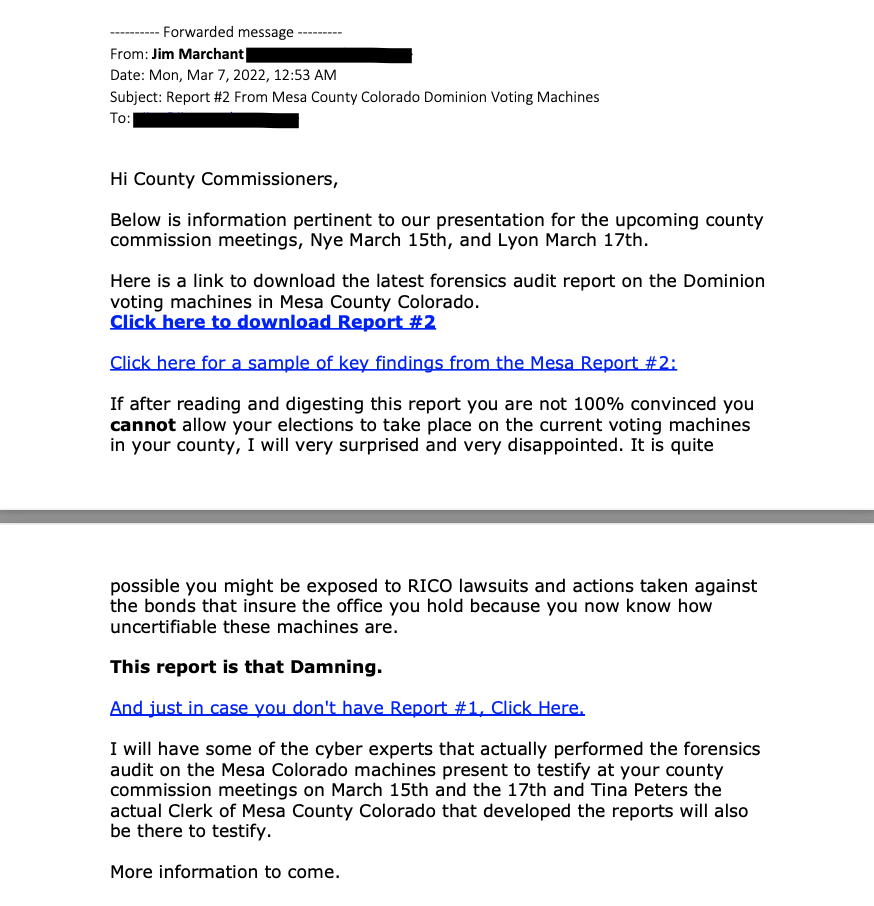
During the March meeting, the Nye commissioners voted 5-0 to ask their county clerk to end use of the voting machines and to hand count results. Republican County Commissioner Debra Strickland said during an interview prior to the meeting that the proposal was brought forward because Nye County citizens have “been asking us to do something.”
“We’ve had plenty of the people of Nye County ask if we wouldn’t have a forensic audit, and of course, there’s no way a forensic audit wouldn’t [sic] do us any good because elections are over,” she said, adding the idea came from a Tea Party presentation to Nye County Republicans. “Let’s try to fix what’s coming next at us. And so I’m hoping that the clerk will consider going to paper ballots.”
Emails exchanged among county staff indicate that an initial version of Strickland’s proposal sought a hand-counted audit of the 2022 general election, potentially conducted by a “Citizen’s Election Audit Committee.” A final version of the proposal aligned with Marchant’s efforts, seeking to do away with electronic voting machines entirely.
But with Merlino still in the clerk’s office, she planned to continue using the voting machines and electronic tabulators during the primary election, despite implicit threats to make a change.
“Will Nye County return to honest voting systems?” one man wrote in an email to Merlino in early April. “Or are we going to have to start a civil war over this issue?”
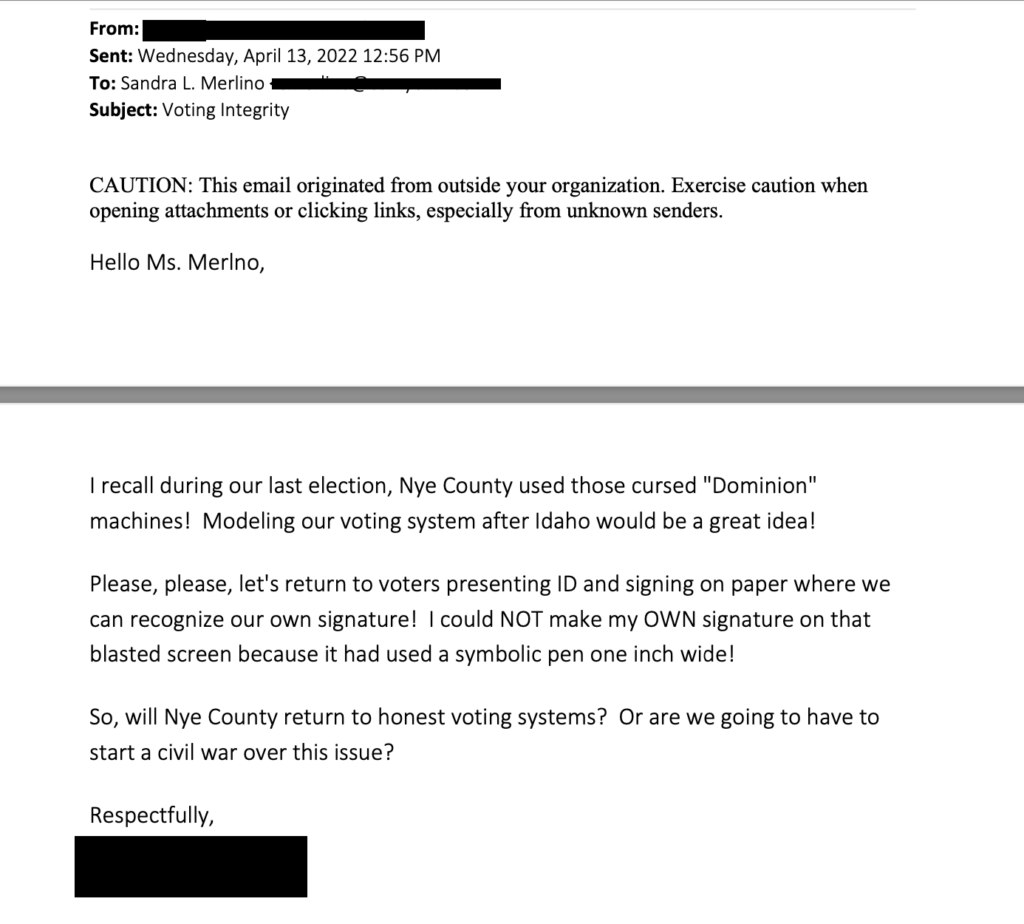
Following their success in Nye County, Marchant and his team continued their tour into two other counties, Esmeralda and Lyon, where Trump won by 67 points and 41 points, respectively, in 2020.
In sparsely populated Esmeralda County, where fewer than 700 registered voters reside, the commissioners sided with Marchant, voting to implement hand counting and all-paper elections. Following the primary election, two county commissioners joined county elections workers in hand counting 317 ballots over the course of more than seven hours. But another hand count in Esmeralda County does not appear to be on the horizon.
“I think we’ve proved that the voting is accurate in our county,” Esmeralda County Commissioner Ralph Keyes said in an August interview. “So, I don’t see this continuing … I just think people want some reassurance that we have fair and accurate elections. That’s all, and I think we showed them that.”
That assessment dovetailed with the perspective of former Republican Gov. Bob List — who this year appeared as a semi-regular staple at county commission meetings where Dominion was on the chopping block. List, whose experience with hand counting ballots stretches back to his days as Carson City district attorney in the 1960s, works as a consultant for Dominion and has occasionally defended the company as it has come under fire in rural Nevada.
During an August interview, he suggested that counties that hand count ballots should also run them through tabulators, and “they’ll find that the machine did a very good job.”
“It doesn’t make a lot of sense to turn the clock back,” he said, adding later, “I was a huge supporter of Donald Trump, but I absolutely know that the machines did an accurate count … It would be impossible in this day and age and stupid in this day and age to try to hand count ballots throughout Nevada.”
“I was a huge supporter of Donald Trump, but I absolutely know that the machines did an accurate count … It would be impossible in this day and age and stupid in this day and age to try to hand count ballots throughout Nevada.”
— Former Republican Gov. Bob List, during an August interview with The Nevada Independent
Push to eliminate voting machines fails elsewhere in rural Nevada
Despite successful efforts in neighboring Nye and Esmeralda counties, Marchant’s efforts failed in Lyon County, another deep red county home to more than 40,000 registered voters, third most in the state.
There, similar proposals had circulated for months before Republican County Commissioner Ken Gray, who will likely become a state assemblyman next year, sought an “election integrity” agenda item in January.
By late March, the item had transformed into something resembling Marchant’s vision, with a request for precinct-level voting, “secure paper ballots,” and hand counting.
During an April meeting to consider the item, Lyon County Clerk Nikki Bryan raised a slew of concerns with the proposal, arguing that it would be logistically impossible to implement ahead of the primary election, time consuming and costly. The commissioners dropped the item, opting instead at a May meeting to send a resolution to state officials and lawmakers, asking them to adopt a set of election changes that included a repeal of universal mail-in voting.
Though Marchant only found success in Nye and Esmeralda counties, he expressed a desire to promote his plans across the state.
But similar proposals failed elsewhere. In Elko County, commissioners considered alternatives to Dominion machines across multiple meetings. Those efforts were supported by the county’s Republican Party, which last year approved a resolution “urging replacement of Dominion voting machines.”
Ultimately, attempts to move away from Dominion this election cycle failed in Elko, as the county clerk attested to the security of the election systems and raised concerns about potential financial penalties of ending the county’s contract with the company.
But Elko County commission meetings remain a hotbed for election conspiracies and efforts to overhaul election administration. During a September county meeting, following requests from disgruntled citizens, the commissioners considered a “forensic audit on the primary election results.” At a meeting in October, the commissioners received a request for hand counting ballots in the general election. Neither proposal succeeded.
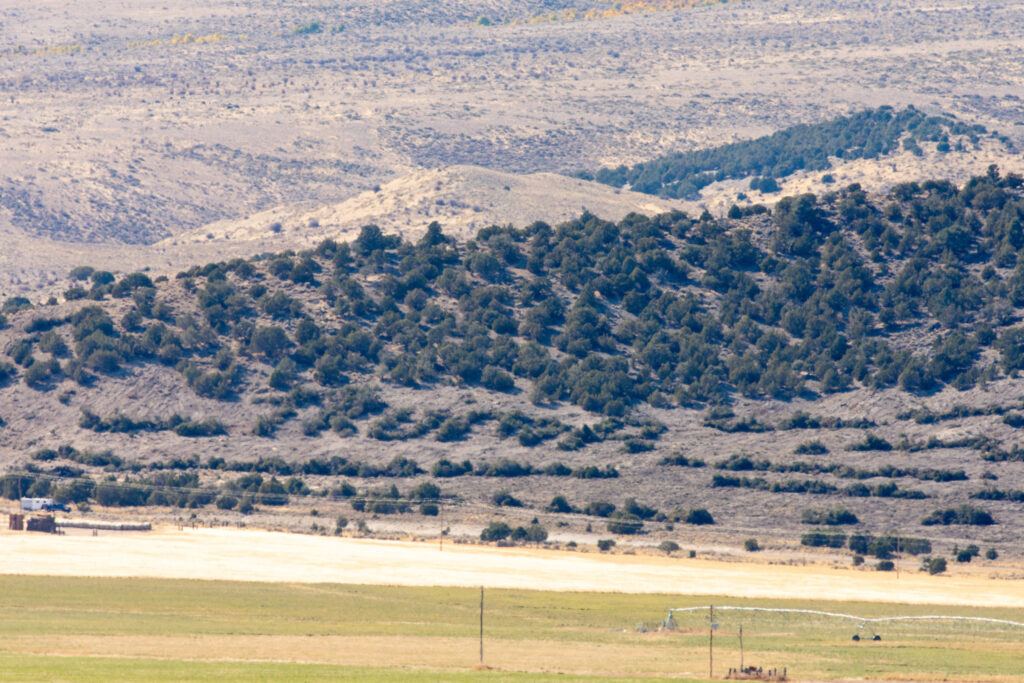
A major county gets involved
While most attempts to get rid of voting machines began and ended in rural Nevada, a faction of displeased voters in Washoe County helped propel a sweeping election proposal in the state’s second most populous jurisdiction, setting up a battle between conspiracy theory-driven voters and officials who attested to the integrity of elections in the county.
The proposal brought forward by Republican County Commissioner Jeanne Herman — and later shot down by the county’s four other commissioners, two Republicans and two Democrats — sought even greater changes than considered in any other county on top of a proposed shift to paper ballots and hand counting. It also sought a five-year expiration date on voter registrations and sheriff’s deputies or members of the Nevada National Guard stationed at polling locations.
Herman’s proposal was introduced soon after a contentious county commission meeting in early February. During more than four hours of public comment, angry voters railed against alleged election fraud.
Among those leading the charge was Robert Beadles, the election integrity chair for the Washoe County GOP Central Committee. He described elections in Washoe County as a “third-world joke,” and asked the commissioners to adopt his 95-point election integrity petition as a resolution, which called for a litany of changes. At another February meeting, he accused the county registrar of treason.
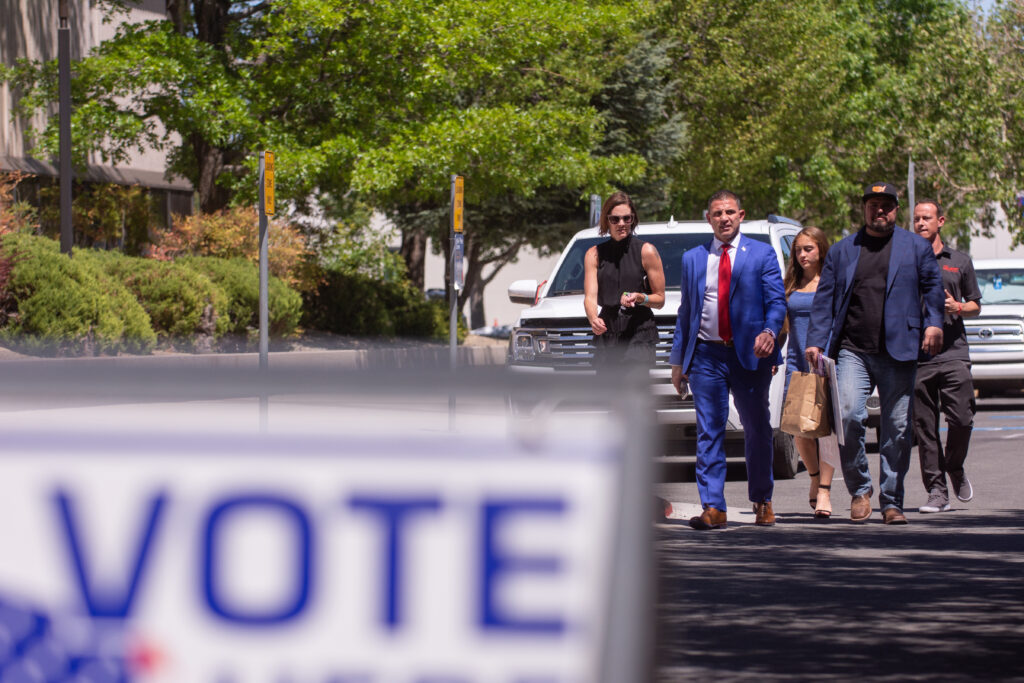
In an email to The Nevada Independent, Beadles wrote that he dug into what happened “to our elections” around January of 2021, adding that the 95-point resolution “was based on our findings and the voter’s concerns they publicly or privately addressed with us from past elections.”
“It’s simple, if the state really wants we the people to trust our elections they would listen to us,” he wrote. “We want hand count, physical paper ballots, counted and voted at a precinct level, reported at a precinct level, for ALL Nevadans to have 100 [percent] transparency into.”
During a March meeting that lasted more than 11 hours, largely driven by public comment, the commissioners rejected the resolution in a 4-1 vote. Two Republican commissioners had expressed support for portions of the proposal, including ways to keep the county’s voter rolls clean, but they wanted to vet other proposed changes and were concerned about the legality of them.
To learn more about Beadles, a wealthy Washoe County resident who has used his platform and money to spread conspiracy theories and question the election system, read The Nevada Independent’s story on his efforts to reshape Nevada politics.
Illegitimate evidence of fraud used to justify voting changes
Throughout their attempts to eliminate voting machines and make other election administrative changes, election-denying activists in Nevada often relied on disproven and unreliable evidence, ignoring the layers of security present in the state’s election systems that have resulted in a miniscule number of fraud cases in recent elections.
Marchant, in his presentations to rural Nevada counties, used so-called “forensic reports” from Mesa County, Colorado to promote the idea that the machines are not secure. Though some cyber security experts have expressed concerns that the reports do reveal some potential vulnerabilities in the systems, they do not provide evidence that such vulnerabilities were exploited.
The reports also fail to capture the multiple layers of physical security that prevent computer vulnerabilities from being exploited. In Nevada, election officials follow strict protocols regarding use of the machines, including who has access to them and when, and voting machines are also kept secure with physical locks that prevent access to any ports on the machines.
Gowri Ramachandran, an elections expert with the Brennan Center for Justice, a nonpartisan law and policy institute at New York University, pointed to layers of testing and security that are required under Nevada’s laws and election regulations. Those layers include pre-election logic and accuracy testing, which ensures the machines function properly, post-election audits and auditable paper trails.
Voters even play a role in that security. Most voting machines in Nevada include a voter verifiable paper audit trail, also called a VVPAT, which serves as a paper receipt of the electronically cast votes. Voters can view that paper record to ensure their votes are recorded accurately before casting their ballots. Other Nevada voting machines mark a voter’s selections on a paper ballot.
By 2024, all clerks in Nevada will be required to conduct risk-limiting audits following each election. Also called “RLAs,” these are considered the gold standard of post-elections audits. They involve a hand count of a statistically significant number of randomly selected ballots to verify the result of an election.
“It doesn’t make sense to say get rid of the machines entirely, rather than use those layers of protection because this alternative of hand counting itself has problems,” Ramachandran said.
Election deniers find common ground in Las Vegas and nationwide
The in-state movement toward eliminating voting machines and implementing hand count was far from isolated to only Nevada-based activists.
In July, Marchant, Gilbert and several county officials joined prominent national election deniers — including MyPillow CEO Mike Lindell and leaders of True The Vote, a group that has spread theories of mass voter fraud — for a conference hosted by the Constitutional Sheriffs and Peace Officers Association, a right-wing group that asserts that sheriffs are the country’s supreme legal authority.
The group has close ties to two counties heavily involved in the recent election efforts. In 2021, Lander and Elko counties became the first local governments to join the association.
The July event underscored efforts to broaden the scope of election activism led in part by Marchant and Gilbert. Marchant said he “would like the sheriffs to man the polling locations,” as part of his goal “to fix our elections.” Sheriffs from other states spoke about their own efforts to investigate election complaints.
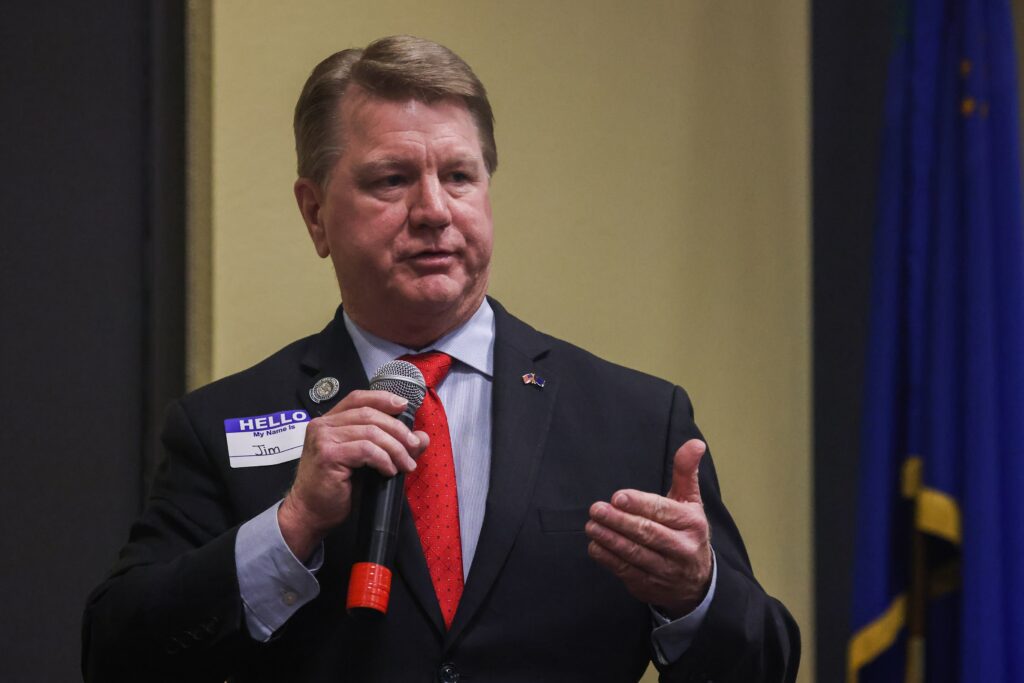
During his speeches to several county commissions, Marchant spoke about outside groups that could provide counties with resources to conduct hand counts, including the Tea Party. He is also pushing for his election ideas statewide through his campaign for secretary of state, and in other states, through his America First Secretary of State Coalition.
“We can bring in an army to help you capture votes,” he told the Esmeralda County commissioners in April.
‘Potential for chaos’
As it stands now, only one county appears on track to conduct a full hand count of votes in this year’s general election.
In Nye County, recently appointed clerk Mark Kampf plans to tally votes using both mechanical tabulators and a hand count, with batches of 50 ballots processed through both methods in a “parallel tabulation.” According to a presentation regarding his plans for the count, Kampf expects to finish the hand count between Nov. 10-14, using eight teams of five to perform the count — one reader, one verifier and three talliers who must match up their results for every batch of 50 ballots.
Kampf’s planned hand count would, in effect, function similarly to a post-election audit, but prior to the certification of the election, and broader in scope than the trusted risk-limiting audit method.
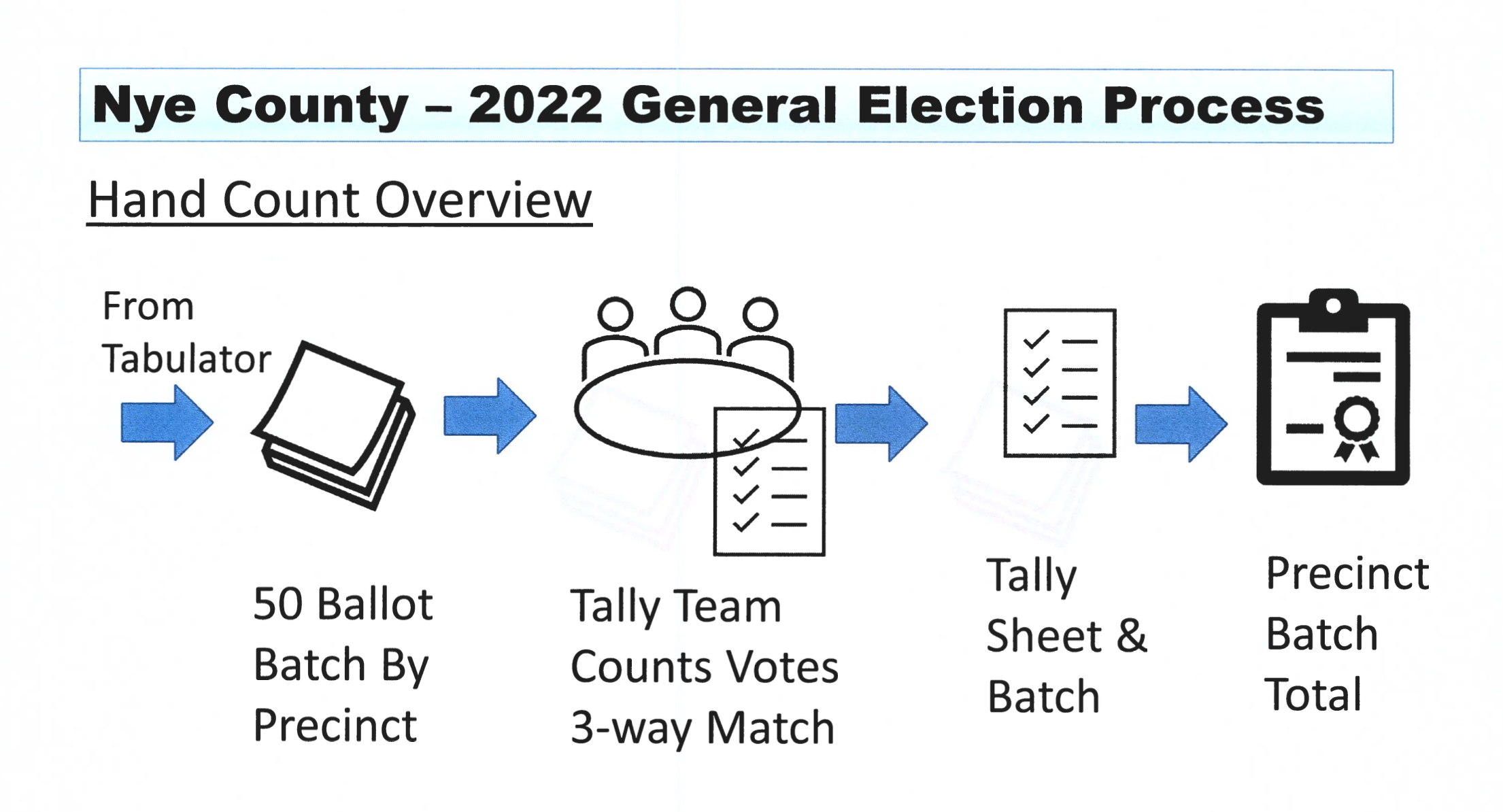
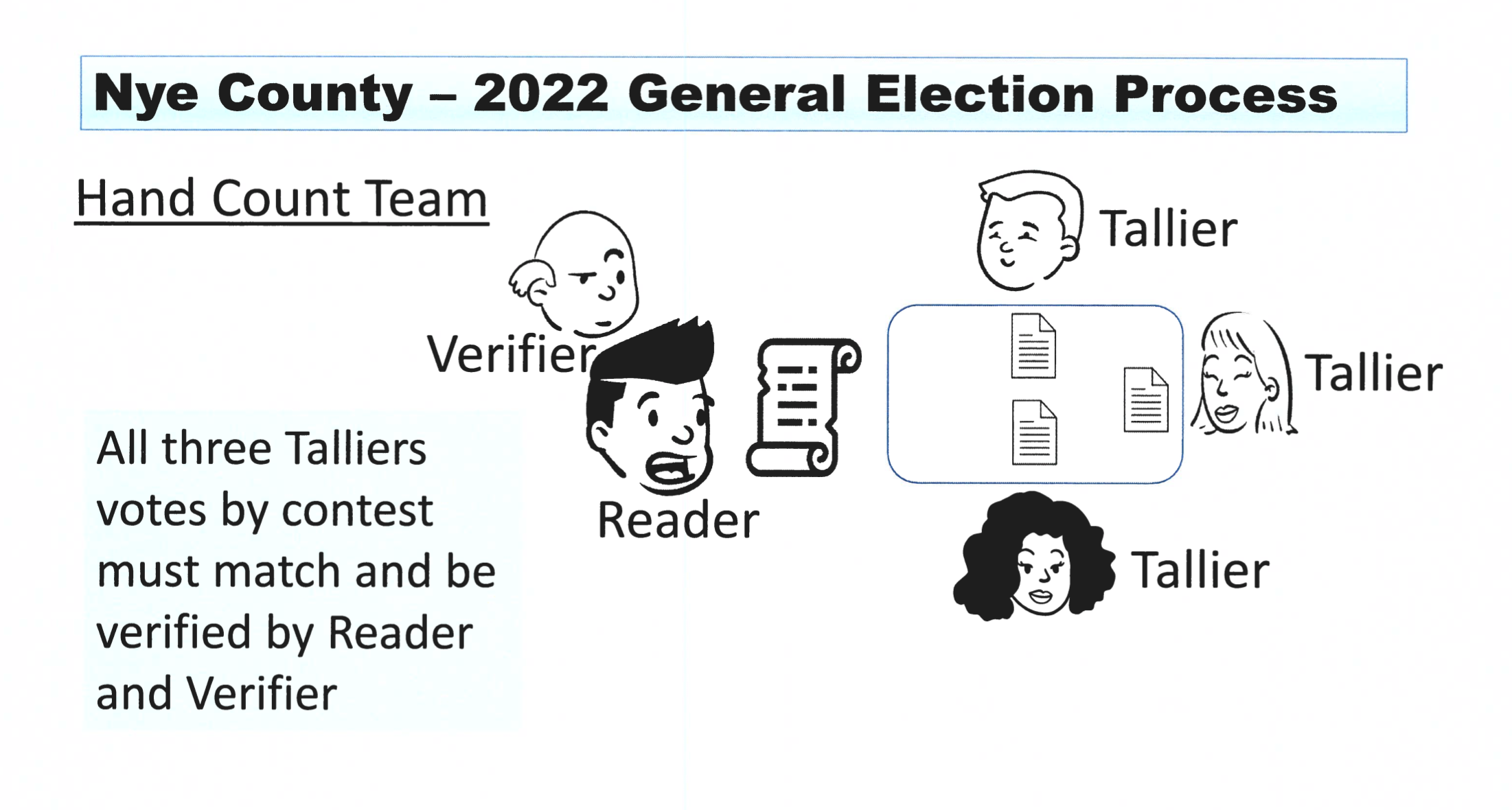
In a September interview, Kampf framed the changes as a way of restoring voter confidence, saying that he has gotten an “overwhelming response” from Nye County voters who believe their votes don’t count or who do not trust the machines.
“What I want to do is increase the level of transparency that you do not have with [an] electronic machine to show people that their vote is being counted properly,” he said.
He also plans to significantly reduce the use of electronic voting machines, providing most voters with paper ballots in person, while allowing voters with “special needs” to vote at a single voting machine available at each polling location.
“If you look at the primary this year, 63 percent of the voters used a mail-in ballot option,” Kampf said. “We’re doing the remaining 37 percent with the same ballot that you would be doing through a mail-in. Now, there’s going to be different designations on them, so that we know the difference between a mail-in ballot and one that was voted in person, and we keep them all straight.”
But the decision has been panned by voting rights groups and some legal experts. Ramachandran took issue with Kampf’s plans to start hand counting ballots, in public view, on Oct. 25, two weeks before Election Day. Though state law allows for the counting of mail ballots prior to Election Day, it also criminalizes the release of mail vote counts prior to the close of polls.
“They can just sit there and watch you read out loud … so it’s just not possible to be public about your process and hand count, while also not being public about how the different candidates are doing so far,” she said. “But with a tabulator you can do that.”
Multiple voter advocacy and progressive groups have filed lawsuits challenging the county’s plans for hand counting, including a challenge from the American Civil Liberties Union of Nevada that cites concerns about the early release of results through the verbal announcement of results from each ballot. But court filings submitted by attorneys representing Nye County indicate that Kampf does not plan to release video footage of the hand count until after the polls close on Election Day, and observers will be notified of state law prohibiting the early release of results.
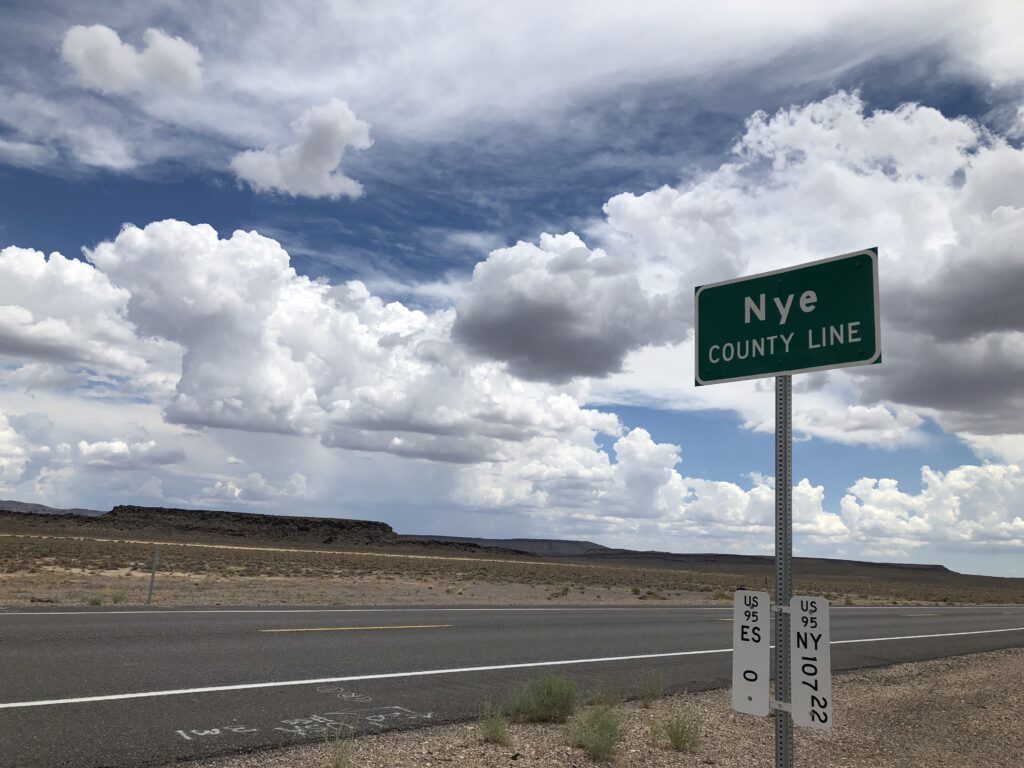
The size of Nye County also presents challenges unlike those present in other jurisdictions across the country where hand counting is used to tally votes. Less than 1 percent of registered voters live in jurisdictions where ballots are hand counted, many of them in small towns in New England and Wisconsin, according to data from the election technology group Verified Voting. The most populous hand count jurisdiction is an Idaho county with roughly 6,000 registered voters — significantly fewer than the more than 30,000 in Nye County.
Bryan, the clerk in Lyon County, home to more than 40,000 registered voters, does not see how hand counting could be effectively conducted in a jurisdiction of her county’s size.
“There is so much potential for error that — and plus I’m not sure that a county our size could even count all of those ballots by hand and have it be done in the length of time that we have to have the canvas done,” she said. “Logistically, it’d be almost impossible to get all of that done.”
But Kampf pushed back on his plans’ critics, saying during an interview that he has been involved in manual accounting systems before and has “seen them balance quite accurately every single day.”
“Counting the votes is no different than counting dollars,” he said. “We’ve already done tests, in the last several weeks, of hand counting and seeing how they total and it’s worked just fine, and actually, we’ve been able to get it done a lot faster than we thought we would … I feel that we have already internally proven to ourselves that it can be done.”
He also has not hid the desire to one day transition to counting ballots strictly by hand. During a September meeting, one county commissioner said the process could lead to elimination of the tabulators or let them know if “the tabulators are any good or not.”
Kampf replied, “That’s exactly right.”
Despite Kampf’s confidence in the process, Ramachandran raised concerns about implementing a new widespread system for counting votes so close to the election.
“If you want an election with integrity that’s free and fair, focus on providing a smooth process for voters and implementing the procedures that are already in place in Nevada and do a good job of implementing those, instead of making up this new procedure this late in the game,” Ramachandran said. “[I’m] concerned about potential for chaos in terms of all of that being rolled out so close to the election.”
When the polls close Nov. 8, all eyes will be on Nye County — and not just for election results.
Correction: 10/24/22 at 10:05 a.m. — This story was updated to correct the word “now” to “not” in a quote from Douglas County Clerk Amy Burgans’ email to Mark Wlaschin.
